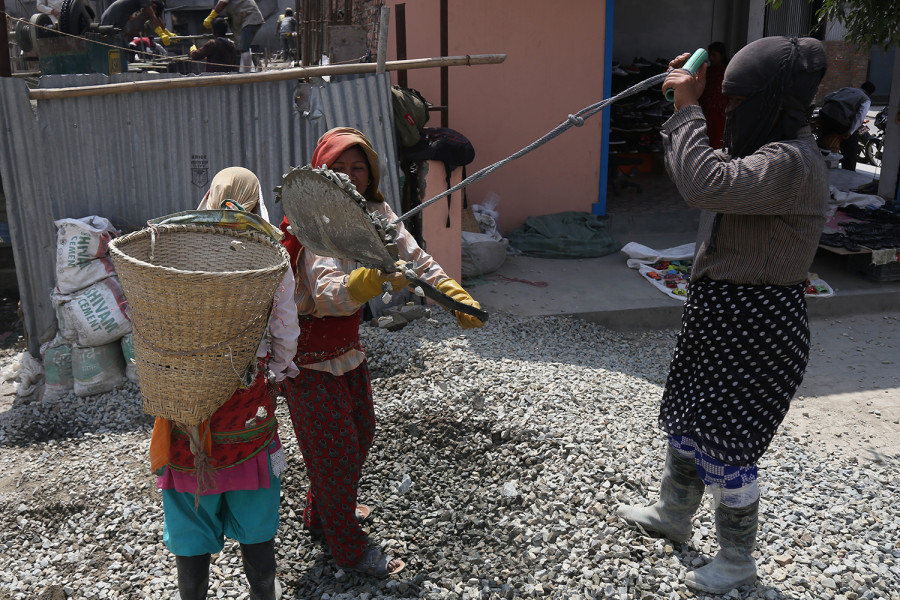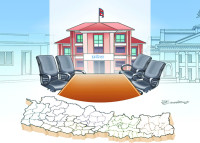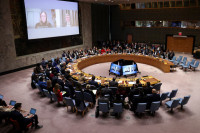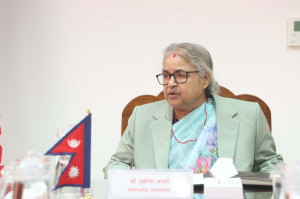Columns
Women construction workers: Organising for change
Women must be central to making workplace demands and demands on the government, both through formal trade unions and informal strategies.
Feyzi Ismail
At the end of May this year, unionised and non-unionised women working in the construction sector across Nepal came together to discuss the multitude of issues that they face in the industry. They sought first to identify key challenges for women workers—and whether there were similar experiences across different districts—and then formulate strategies and approaches to address them.
The women came from Kailali, Myagdi, Kavre, Sindhupalchowk and Saptari, plus from Kathmandu and Lalitpur, and discussed everything from wages and working conditions, sexual harassment and health and safety in the workplace, to discrimination, time poverty and childcare. These were timely and important discussions in the context of recent government initiatives around minimum wage, equal pay, social security and guaranteed work.
New role, same story
While women have long been present in the construction sector as part of family units, they are increasingly entering the industry as independent wage-earners, in many cases the main breadwinners of their households. Often, women work in the worst jobs in construction—carrying bricks and sand, breaking stones and working with heavy machinery without protective gears.
Most are still categorised as ‘helpers’ and a much smaller number have begun to work as masons, although even women who have been able to access the post-earthquake mason training have encountered barriers within the industry. In Kathmandu, a number of women are marble-chip workers—some own their own machines—or have worked up to being petty contractors. But they also face discrimination and poor working conditions.
The industry is dominated by men—whether workers or contractors—who do not share the needs and demands of women workers for work site toilet facilities, for example, or for childcare. They do not face the burdens of the hours of household work, which women do in the morning and after returning from their paid jobs. Women also recount experiences of sexual harassment at worksites, and discrimination over wages, even more than in other sectors.
Unsurprisingly, one of the central issues that emerged from the strategy meeting was wages. Women still earn almost 30 percent less than men for the same work, and sometimes far below the minimum wage of Rs13,450 per month. Closing the gender pay gap is crucial, but the women say that wages are only one part of the wider problem: the issues that concern them are also to do with welfare in general—decent housing, guaranteed work, childcare and whether they can send their children to school. They stressed that the minimum wage should be a living wage.
Recently, some municipalities have taken measures to abolish the gender wage gap, but it begs the question as to why it continues elsewhere. The District Coordination Committee in Makwanpur announced earlier this year that it would implement equal wages across the district, including in the agricultural and construction sectors. This follows Panauti Municipality in Kavre, which ended the wage gap last year. But where municipalities and sectors drag their feet, women are also coming together to struggle for equal wages and workplace rights.
More and more women construction workers are joining unions. The unions help with claiming compensation for injuries, harassment and negotiating with contractors. However, the vast majority remain non-unionised—in many cases fearing that membership makes them less attractive to contractors.
Banding together
Union work often spills over into organising in informal ways across different worksites. Where women meet regularly to support each other, find work for each other and sometimes participate in union-based savings cooperatives, conditions improve. Joining the union and working collectively requires more of women’s time and often women endure social pressures associated with being a trade unionist. But these initiatives have made women more confident and able to speak out for the collective. Rather than focusing on an individual, formal and informal organising strengthens working conditions in the sector as a whole.
This past May Day, women construction workers made demands for the minimum wage, equal pay and social security. The government must now ensure that these initiatives are implemented, regulated and monitored, especially in the informal economy. Regulating the conditions of informal work means that every worker should have a contract that sets out the conditions of work and who is responsible for pay, safety and security.
This includes toilet facilities, safety equipment and compensation for injury. It must help to ensure that women workers are free from harassment of any kind and have effective and timely means of redress if it does occur. It includes a commitment to equal pay and a living wage. The Social Security Act and the Labour Act both contain provisions that require employers to maintain health and safety standards and compensation. These must become a reality for both women and men.
If the government is serious about implementing labour reforms—and standing by promises for gender equality in the constitution—in addition to regulating informal work, it must also put in place mechanisms for workers to file grievances at local levels and facilitate greater trade union rights, which must be enshrined in legislation. Next week, women construction workers are due to meet government officials in a roundtable discussion to continue a dialogue about what can be done.
Change is happening but all too slowly. Women must be central to making workplace demands and demands on the government, both through formal trade unions and informal strategies. In a context where men are leaving to work abroad, and women often constitute the majority of labourers in a particular locale, the experiences of women mobilising to ensure better working conditions are very significant. Women workers’ associational and collective power have the potential to bring about important economic and social change in Nepal.
***
What do you think?
Dear reader, we’d like to hear from you. We regularly publish letters to the editor on contemporary issues or direct responses to something the Post has recently published. Please send your letters to [email protected] with "Letter to the Editor" in the subject line. Please include your name, location, and a contact address so one of our editors can reach out to you.




 6.84°C Kathmandu
6.84°C Kathmandu















